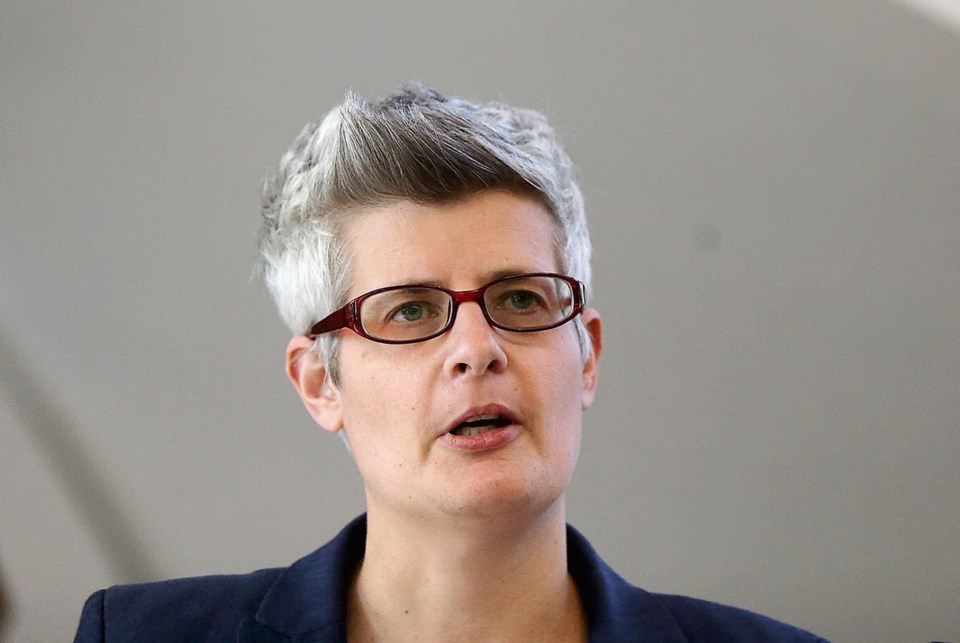Victoria Mayor Lisa Helps has deactivated her Twitter account in response to negative comments about homelessness in the city that she says were distracting from her attempts to highlight positive initiatives.
On Friday, Helps tweeted about the Ocean Futures Innovation Hub, a proposed business hub for the marine sector in downtown Victoria. The tweet attracted a slew of comments criticizing Helps’s performance as mayor and bemoaning the homeless population that has become more visible during the pandemic, which has forced shelters to close or reduce capacity.
Critics also piled on after Helps shared a photo Saturday of a floating dock installed in the Gorge Waterway by Aryze Development.
Helps said it’s not the criticism that bothered her, since her tweets often attract negative comments from people who don’t like how she does her job.
“Criticize me all you want. That’s fine,” she said. But Twitter users were complaining about homelessness on posts unrelated to the issue, which Helps said distracted from the uplifting stories of business- and citizen-led initiatives she was trying to highlight.
“Everyone’s working so hard to be positive and to bring forward positive initiatives that if my Twitter feed is a detraction from that, then it’s not worth it to me to be on there,” she said.
Helps said there are useful ways for residents to communicate concerns, and commenting on Twitter isn’t one of them.
She holds monthly community drop-ins for residents to meet with her and have a conversation. The events have gone virtual during the pandemic.
She said no one attended her last drop-in on July 15. “No one came to actually have a conversation about these issues.”
Helps acknowledges that the city, like many across the country, has a homelessness crisis that has worsened with the pandemic. She has called it “a failure by everyone” that anyone is living in a tent in Canada.
“It’s having a negative effect on so many people, those who are homeless and those who are housed. We’re working hard every day to manage the crisis and we’re working with the wonderful ministers and staff at the province to resolve it, to get people housed with the supports they need,” Helps said.
Campers in Beacon Hill Park have become a point of tension in Victoria, with more than 19,000 people signing a petition to “save” the park from the roughly 100 people calling it home. The petition calls on the city to remove campers from the 83-hectare park.
More than 340 people have been moved into hotel rooms in buildings purchased by B.C. Housing during the pandemic.
But there aren’t enough indoor spaces. Beacon Hill is not the only place where people are taking shelter. A group of tents is set up in Centennial Square and in other pockets around the city.
Forcing people out of Beacon Hill won’t solve the problem as long as people are without homes, and it would go against the guidance of provincial health officer Dr. Bonnie Henry, Helps said.
Henry has suggested that local governments consider relaxing bylaws that prohibit sheltering, as Victoria has done. Council voted in May to allow 24/7 sheltering amid the pandemic.
“Clearing or moving encampments without providing shelter or housing immediately can cause people to disperse throughout the community and break connections with service providers. This increases the potential for infectious disease spread and may lead to isolation, which also poses health and safety risks to vulnerable people,” Henry’s guidance says.
Those living in tents in Beacon Hill have been asked to move out of the park’s environmentally sensitive and culturally significant areas to other parts of Beacon Hill. Sheltering is allowed in about one-quarter of the park.
About 1,000 to 1,200 people are living in 40 encampments across the province.
Helps left Facebook in 2018, calling it a toxic echo chamber. She hasn’t posted to Instagram in more than a year. She plans to delete her account after a photo of a sunset over Willows Beach prompted “some really awful misogynist, deeply inappropriate comments.”
David Black, an associate professor in the School of Communication and Culture at Royal Roads University, said social media has provided residents greater access to share concerns with politicians. “But that also sometimes means that people aren’t measured and fair and evidence-based in their views,” he said.
Helps said she’ll be back on Twitter “when the time feels right.” Residents can still share concerns with the mayor via email or phone, by requesting to address council or by joining a community drop-in. The next drop-in is Aug. 11 at 4:30 p.m.



